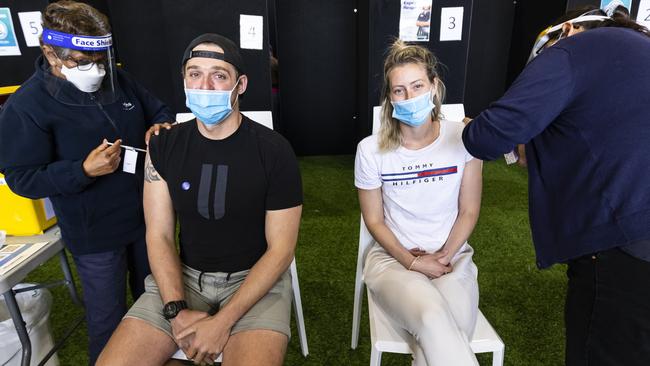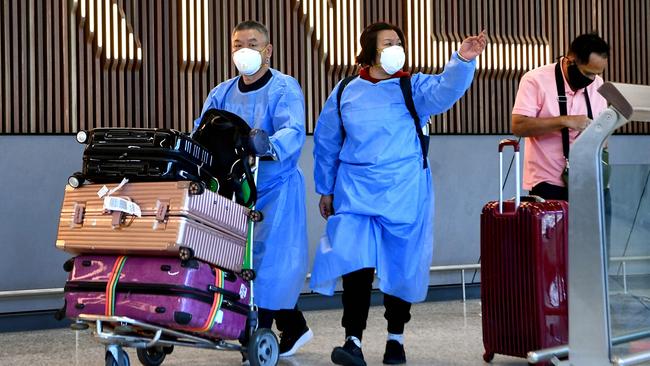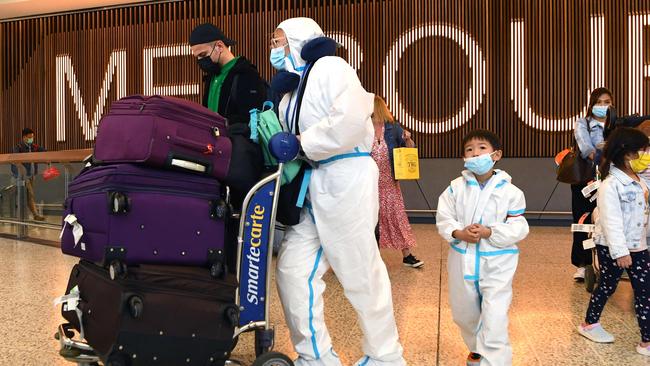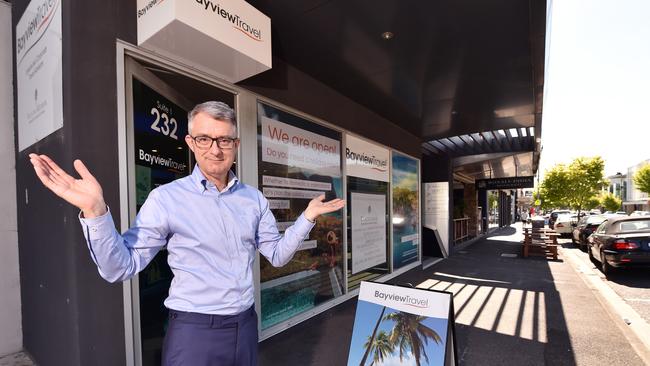Victoria manufactures mRNA vaccine that could bust Omicron variant
Victoria will keep quarantine arrangements in place for overseas travellers amid the Omicron threat, while a Melbourne-made vaccine could potentially bust the new variant.
Coronavirus
Don't miss out on the headlines from Coronavirus. Followed categories will be added to My News.
• This coronavirus article is unlocked and free to read in the interest of community health and safety. Tap here for our latest great value offer and instantly access trusted news from the Herald Sun and Leader.
The state government will keep quarantine arrangements in place for overseas travellers amid the new Omicron threat.
All international arrivals must complete a PCR test and isolate at home for three days.
They will also be required to do another PCR between days five and seven..
The announcement comes after Premier Daniel Andrews joined other state leaders in a national cabinet meeting with Prime Minister Scott Morrison.
Meanwhile, Victoria has successfully manufactured its own mRNA Covid vaccine candidate, with human trials on the potential Omicron buster to begin in the new year.
It comes as Victoria recorded 918 new local Covid-19 cases on Tuesday and six more deaths.
Medical Research Minister Jaala Pulford on Tuesday revealed the state, working with health researchers and private companies, now had the ability to produce the cutting-edge technology at home.
Researchers at Monash University have been developing the vaccine this year, which targets a different part of the Covid-19 spike protein.
It was designed to withstand the Beta variant, which showed some resistance to vaccines, but scientists believe it may also be useful against Omicron because it shares some mutations.
Vials of the new jab have been successfully manufactured by IDT Australia in Melbourne, with the company capable of producing 100 million doses a year if required.
Ms Pulford said there were very few places in the world that could manufacture mRNA vaccines and Victoria was now one of them.
“This is also Australia’s first mRNA product that has been manufactured,” she said.
“There are now some approval processes to go through which will take us to the next step, which will be, all things going well, the commencement of those Phase 1 trials in January.”
It comes as the Commonwealth is yet to decide on an “approach to market” process to boost mRNA manufacturing in Australia.
Victoria is in the running and Ms Pulford said the state was a clear choice to receive the funding.
“Our case that we put as industry, science and government to the federal government, is that when they are ready to make those decisions about manufacturing Covid vaccines at scale, but also really diving into that very, very exciting research pipeline around cancer and rare diseases … Then they really need to look no further,” she said.
Professor Colin Pouton, who has led development of the vaccine at Monash University, said he hoped it would be effective against other Covid variants because it was slightly different to existing doses.
“We’re vaccinating with the receptor binding domain … It’s about a quarter of a spike protein,” he said.
“The business end that’s really important is the surface.
“That’s the bit that actually binds the receptor that allows the virus to get into ourselves.”
Prof Pouton said the Omicron variant had about 10 mutations in this area.

“The idea of clinical trials is to ask the question, can we raise specific antibodies which will protect against that new variant.”
Professor Terry Nolan AO, of the Doherty Institute, said the vaccine trial would be offered as a potential booster shot for participants.
He said the vaccine used similar technology to the ones already supplied to the public and they weren’t expecting safety issues, but that every precaution would be taken.
“We don’t take anything for granted,” Prof Nolan said.
“The study itself will produce results probably within two months or so.
“We will be looking for healthy 18 to 70 year olds to volunteer for this study.
“We know there’s a lot of interest from many people who want to contribute which is fantastic.”
Prof Nolan said it was possible the vaccine could be trialled overseas to get more data but that this would take more time.
IDT Australia chief executive Dr David Sparling said they had the capability to produce 100 million mRNA doses a year if required and supported by funding and new equipment.
“There’s still a learning curve to go,” he said.
“But the first steps, I would argue are the hardest.
“We’ve certainly done and performed probably the most challenging component of the manufacture of this product which is the formulation.
“We’re just pleased as punch and there’s a lot of very relieved, very pleased people now that product has met the testing criteria.”
BORDER REOPEN DATE DELAYED
Australia’s borders will remain closed for another two weeks for hundreds of thousands of overseas students, migrant workers and refugees.
The federal government’s national security committee decided on Monday night to pause Wednesday’s planned reopening until December 15 to buy time to assess the new Omicron variant.
Vaccinated travel lanes with Korea and Japan will also not open for two more weeks.
It comes despite top doctors saying the world should want the Omicron variant to spread globally if urgent research confirms it turns the Covid virus into a more mild disease.
Commonwealth chief medical officer Paul Kelly said it would be a “very good Christmas present” if the “highly transmissible” strain turned out to be less harmful and replaced the Delta variant that has ravaged dozens of countries and forced Melbourne into months in lockdown.
But authorities remain on high alert until more is known about the new variant, first detected in South Africa, that has already been identified in several patients in Australia.
NSW authorities last night confirmed two more returning travellers had tested positive to the Omicron strain of Covid-19, taking the state’s total to four.

But genomic sequencing also confirmed a traveller, who visited Victoria from NSW and was suspected of having been infected by the mutant strain, is not carrying the Omicron variant.
Australian scientists are now growing the virus and hope to know within days exactly how effective our existing vaccines are against it.
National cabinet will hold emergency talks on Tuesday to consider tougher precautionary measures, including whether Victoria and NSW will extend their 72-hour quarantine rule for overseas arrivals or force them into two weeks of quarantine.
On Monday night, Scott Morrison’s national security committee met and delayed Wednesday’s reopening of the international border to students, migrant workers and refugees.
Health Minister Greg Hunt also asked the nation’s expert immunisation panel to consider whether to bring forward booster doses from six months after Australians are fully vaccinated, as the Herald Sun revealed leading experts wanted the change to be made.
“If they recommend changes, we will follow those changes,” he said.
More than 415,000 Australians have already received a third shot out of 500,000 who are so far eligible.
Business groups called on state and federal leaders to hold their nerve and avoid “knee-jerk decisions” to tackle the new variant.
Mr Morrison said he would move “very quickly” to adjust border settings if required, but cautioned it was “a bit too early” to return to 14 days of quarantine for arrivals.
“It’s important we just calmly and carefully consider this information, work together, take the decisions that are necessary,” he said.
Professor Kelly said Omicron transmitted at least as fast as Delta, and while some reports from South Africa suggested it was “mostly mild”, other information indicated hospital admission rates were rising.
He said there was “no definite evidence” that Covid vaccines would not protect people against the new variant, as he encouraged Australians to be “alert, not alarmed”.
Australian National University infectious diseases expert Professor Peter Collignon agreed, saying: “We’ve got no evidence Omicron is not covered by the current vaccines”.
If Omicron led to a more mild disease, Prof Kelly said that would be “my number one Christmas present”. “We do not know that yet for sure. And I think it’s very much we need to have a precautionary approach now until we get that information,” he said.
Former federal deputy chief medical officer Nick Coatsworth said the world should “actually want it to spread within your community” if it was milder. “You want it to out-compete Delta and become the predominant circulating virus,” he said.
Kirby Institute scientists are preparing to grow Omicron virus cells to test them against vaccines, a process Associate Professor Stuart Turville said could be completed in a week.

Griffith University Associate Professor Paul Griffin said if existing vaccines did need to be tweaked to tackle the new variant, those changes could be made by vaccine manufacturers within six to eight weeks.
Mr Hunt said Australia’s contracts with Pfizer and Moderna included the option for variant-specific vaccines.
“The early advice is that there are no signs at this stage that there is any breach to the integrity of the vaccine program. But we will follow the medical advice and the scientific evidence on that,” he said.
Senior state government minister Jacinta Allan said health authorities had been “working through the night” to determine future steps.
Federal Labor frontbencher Bill Shorten said the 72-hour quarantine period for overseas arrivals was not enough and should be extended as Australia’s “front line of defence”.
But Business Council chief Jennifer Westacott said: “The worst thing Australia can do in the face of a new Covid-19 variant is panic. Unless the risk level rises dramatically, state governments should forge ahead with the reopening”.
Victorian Chamber of Commerce and Industry chief Paul Guerra said the emergence of Omicron had caused anxiety and concern in the business community and called for authorities to focus on preparing the health system “to ensure that we never go into lockdown again”.
Group of Eight chief Vicki Thomson, representing Australia’s top universities, said she hoped international students and skilled migrants could still return through short-term quarantine arrangements “if changes are necessary in order to keep Australians safe”.

NEW BAN WOULD BE CRUEL
Melbourne travel agents are facing a new wave of uncertainty this holiday season after travel restrictions were reimposed in response to the Covid-19 Omicron variant.
Bayview Travel in Brighton has been dealt “two or three” cancellations in recent days as holiday-makers fear being stranded overseas.
Owner Michael Nolan said the reintroduction of an international travel ban would be a “deal-breaker” for his business, which has struggled during the pandemic.
“You’re not going to go to Fiji for 10 days if you’ve got to go into a hotel quarantine for any period of time,” he said. “Clearly it’s something we don’t want to see going ahead.”
Canberra placed travel bans on southern Africa and a 72-hour quarantine order for all international arrivals in response to Omicron, which was first detected in South Africa. The variant could not have come at a worse time after Australians this month were allowed to travel overseas without exemption for the first time in more than 20 months.
Mr Nolan said he had seen a “definite shift” in recent weeks as Victorians rushed to book overseas holidays.
“There’s been a lot of interest in Europe and the United States but very little interest in Asia unfortunately.
“I’m finding clients are choosing destinations they’re familiar with.”
Despite the new rules, Mr Nolan hopes business will pick up.
— Additional reporting: Jade Gailberger, Sue Dunlevy




